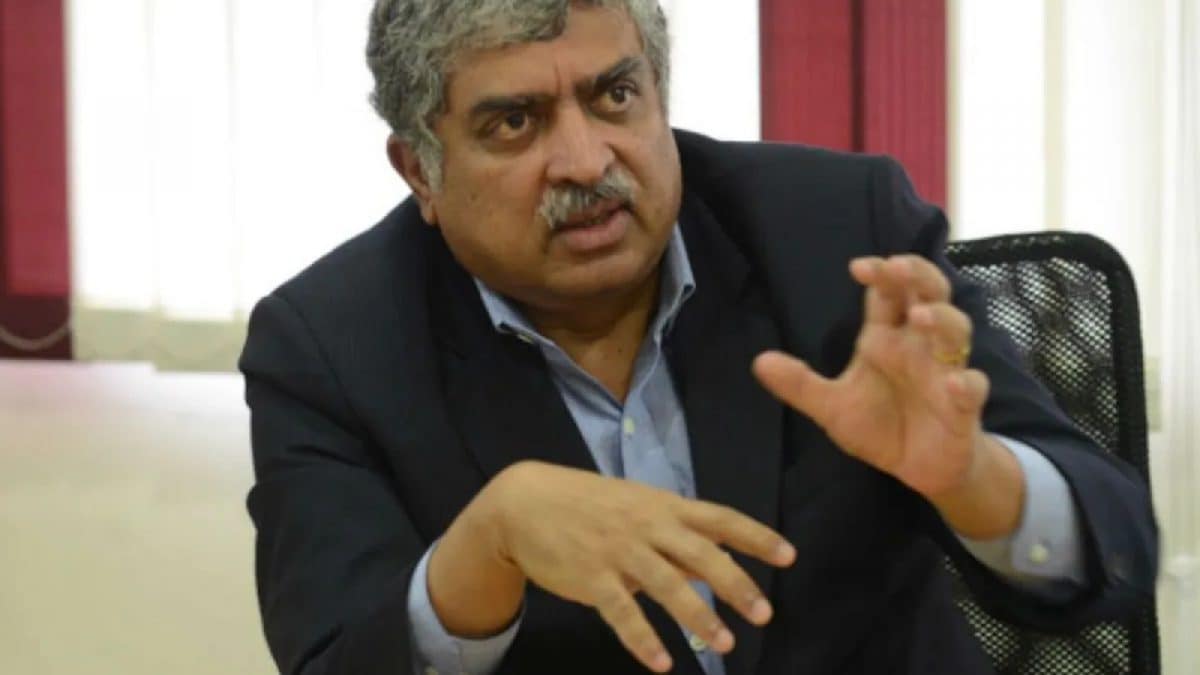Last Updated:
Infosys co-founder says the IT major will use artificial intelligence to its advantage to again move forward and become even more critical to the world’s technology needs.

Nandan Nilekani, co-founder and chairman of Infosys.
Nandan Nilekani, co-founder and chairman of Infosys, has brushed aside concerns over the future of Indian IT, asserting that the industry has repeatedly proved its resilience. The industry’s obituary has been written “many times”, Nilekani said during a panel discussion with Infosys founder N R Narayana Murthy and CEO & MD Salil Parekh.
The trio came together to mark the 25th anniversary of InStep, Infosys’s flagship global internship programme.
“I think there are many times in the past when such obituaries have been written. So, whenever there’s a major technology shift or a major business model shift, people say that. But I’m very, very confident that in the current environment with the advent of AI, certainly at Infosys we can say that not only will we master this technology capability, but we’ll also actually use it to our advantage to again move forward and become even more critical to the world’s technology needs,” Nilekani said.
Parekh echoed the optimism, stressing that Infosys holds a unique position in delivering technology at scale. “The best place for technology at scale is really Infosys, is really India. Because what we do here for large companies, there’s no one else who has that sort of knowledge. These are complex large organisations. And we know how technology works there. Infosys is in a leading position. Actually, Nandan himself is helping, like guiding us into what we are doing on AI,” he said, during a panel discussing marking the 25th anniversary of InStep, the flagship global internship program of the software services major.
He noted that Infosys already has 300 agents working on AI and continues to invest in cloud and data.
Murthy, meanwhile, underlined the enduring importance of adaptability. “The only constant is change. The most important attribute for every successful professional is what I call learnability. So, what is important is not so much the change in technology, it is human beings, it is human relationships, it’s teamwork, all of that. But behind, at the bottom of all of this, is the idea of learnability,” he said.
Nilekani reinforced this point, arguing that human skills will remain central in the AI era. “I think we talked about learnability. We talked about human skills, about collaboration, empathy, leadership, which no AI can do. And we also believe that you must do first principles thinking. I think it’s an area where people will have competitive advantage over AI.”
Parekh recalled Infosys’s ability to navigate past shifts. “If you remember a few years ago, we went through a digital change. We basically did full re-skilling. Everyone became more digital focused. Similar thing is now on to AI, and we will continue with that.”
Their remarks come as growth in the IT sector slows amid global macroeconomic pressures and technological disruption. At the same time, India’s largest software services company, Tata Consultancy Services (TCS), has announced plans to reduce its workforce by about 2 per cent, or more than 12,000 employees, over the next year in a bid to become more agile.
A team of writers and reporters decodes vast terms of personal finance and making money matters simpler for you. From latest initial public offerings (IPOs) in the market to best investment options, we cover al…Read More
A team of writers and reporters decodes vast terms of personal finance and making money matters simpler for you. From latest initial public offerings (IPOs) in the market to best investment options, we cover al… Read More
Read More







